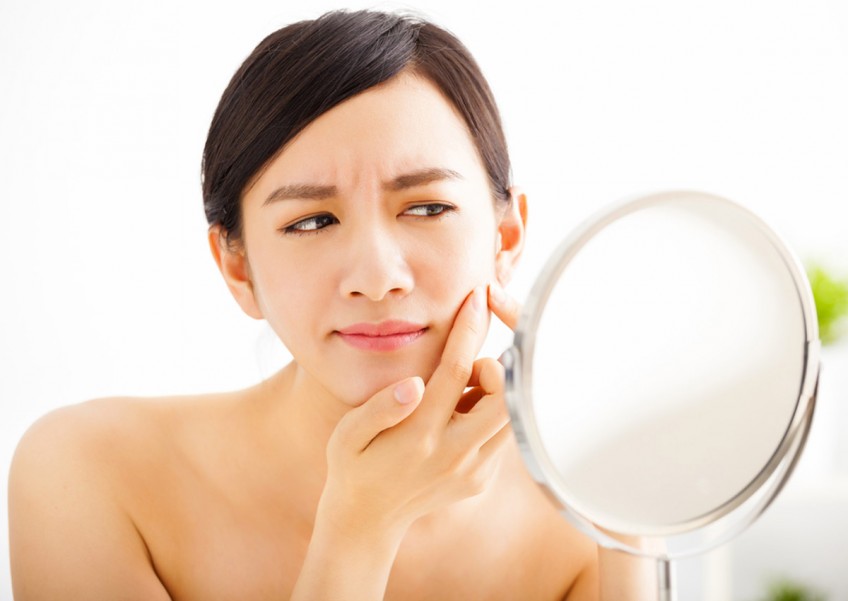Why you're still getting acne as an adult

Dealing with pimples in your teens is just a fact of life. But when you're old enough to rent a car? It's infuriating.
More than 40 per cent of twenty-something guys suffer from acne, according to a study from the University of Alabama at Birmingham. It tends to show up as pink, inflamed bumps along your chin, cheeks, and nose, says Patrick Blake, M.D., a board-certified dermatologist based in California.
So why are you still popping zits as a grown man? Here are some of the most common causes of adult acne-and how to nix it for good.
You're not using moisturizer.
We know what you're thinking: Won't moisturizer make my face even more oily?
Nope, says Seemal Desai, M.D., a professor of dermatology at the University of Texas Southwestern Medical Center.
If you're using skin-drying products-like acne facewash-your body may respond by producing even more grease, says Dr. Desai. And that excess oil can clog your pores, trapping bacteria in and causing zits.
But using a moisturizer will hydrate your skin, preventing it from producing too much oil.
The Fix: Gently wash your face in the morning and at night.
If you have oily skin, look for a wash that contains 2 to 3 per cent salicylic acid, like Neutrogena's Men Acne Wash, suggests Dr. Desai. Sensitive skin? Glycolic acid, found in Peter Thomas Roth's Face Wash, tends to be less irritating.
After washing, lather on moisturizer.
Your phone is grimey.
Think about it: You touch your sticky keyboard, then send a text, maybe bite your nails, then make a call, holding your cell phone against your cheek.
It's no wonder your smartphone is a hotbed for acne-causing bacteria. Each time you put your phone to your face, you risk those germs seeping into your pores, potentially causing pimples.
This type of acne even has a name: Acne mechanica, in which rubbing against external objects causes breakouts. "I see a lot of patients whose acne is worse on one cheek than the other," says Dr. Desai.
The Fix: Wipe your smartphone screen with an alcohol pad every day to eliminate the bacteria, suggests Dr. Desai.
You're eating the wrong carbs.
A diet high in refined carbs like white bread or even sugary energy bars can promote oil production, says Men's Health deramatology advisor Adnan Nasir, M.D., Ph.D.
Skeptical? In a recent Korean study, people who followed a low-glycemic diet that emphasised whole grains, fruit, and vegetables in favour of more refined carbs had fewer pimples after 10 weeks. Their oil-producing glands actually shrank, too.
The Fix: You don't have to give up bread-the Korean study participants got 45 per cent of their calories from carbohydrates.
But if you're not already watching your added sugar and opting for whole grains, consider doing it for your skin.
And the more you can avoid putting phone to face, the better. Instead, opt for speaker phone or headphones when you make a call.
You're working 60-hour weeks.
Stress really can wreak havoc on your skin, says Dr. Blake.
Anxiety causes an increase in inflammatory markers called cytokines, he explains. These chemical signals trigger oil production-and subsequent breakouts.
The Fix: Reducing your stress is a tall order: For ideas, try these 19 Ways to Live a Stress-Free Life.
In the meantime, use a spot treatment, suggests Dr. Nasir. Apply a benzoyl peroxide ointment directly to your pimple. The benzoyl peroxide will kill the bacteria inside your zit, nipping the infection in the bud.
It's in your genes.
So you weren't blessed with great skin. Bad genetic luck is one of the most common causes of adult acne, says Dr. Blake. It's frustrating, but not hopeless.
The Fix: See your dermatologist, who may suggest a more aggressive treatment, says Dr. Blake. Your options may include antibiotic ointments or pills that kill bacteria, or even more potent drugs like isotretinoin (previously known as Accutane), which halts oil production.

Visit Men’s Health for more stories.